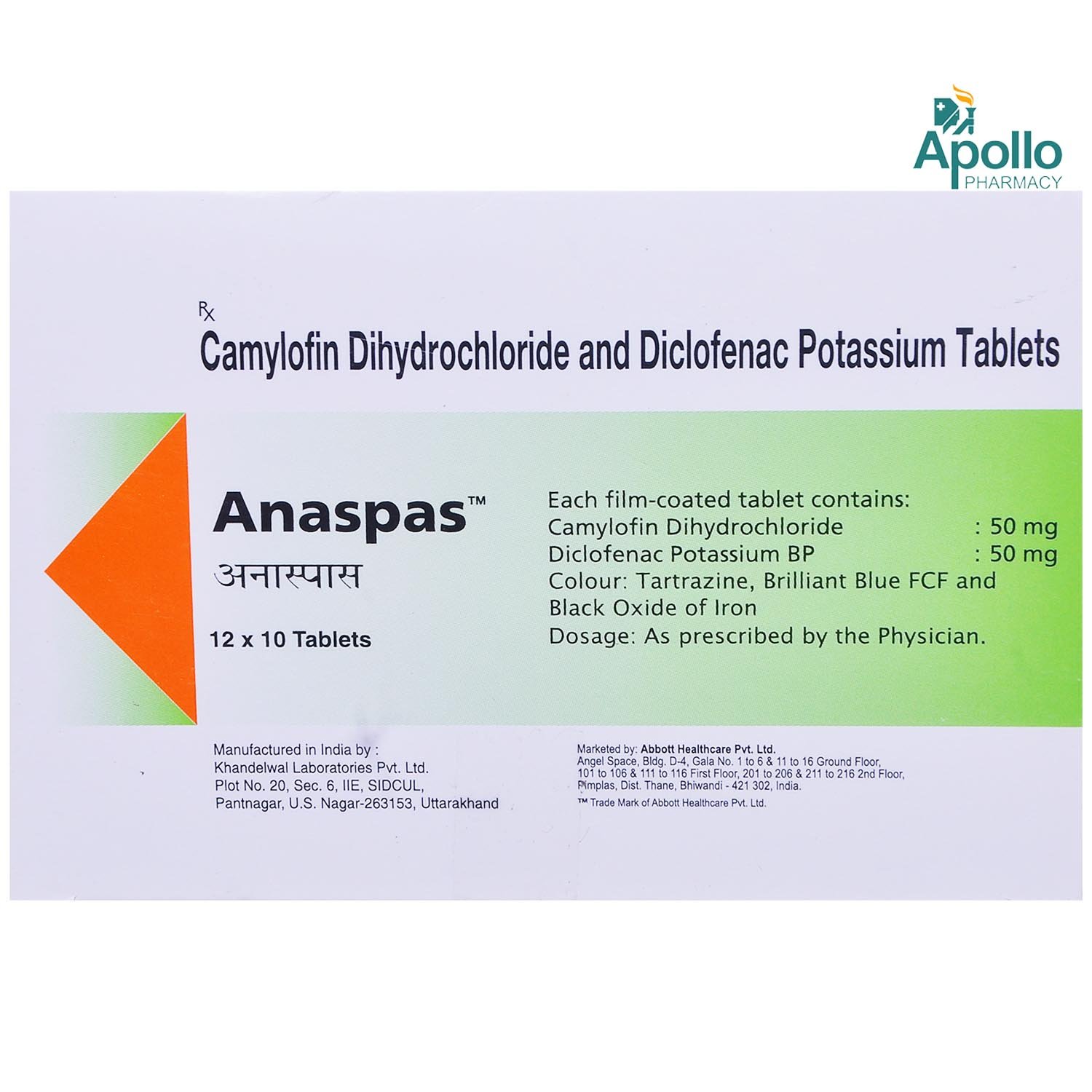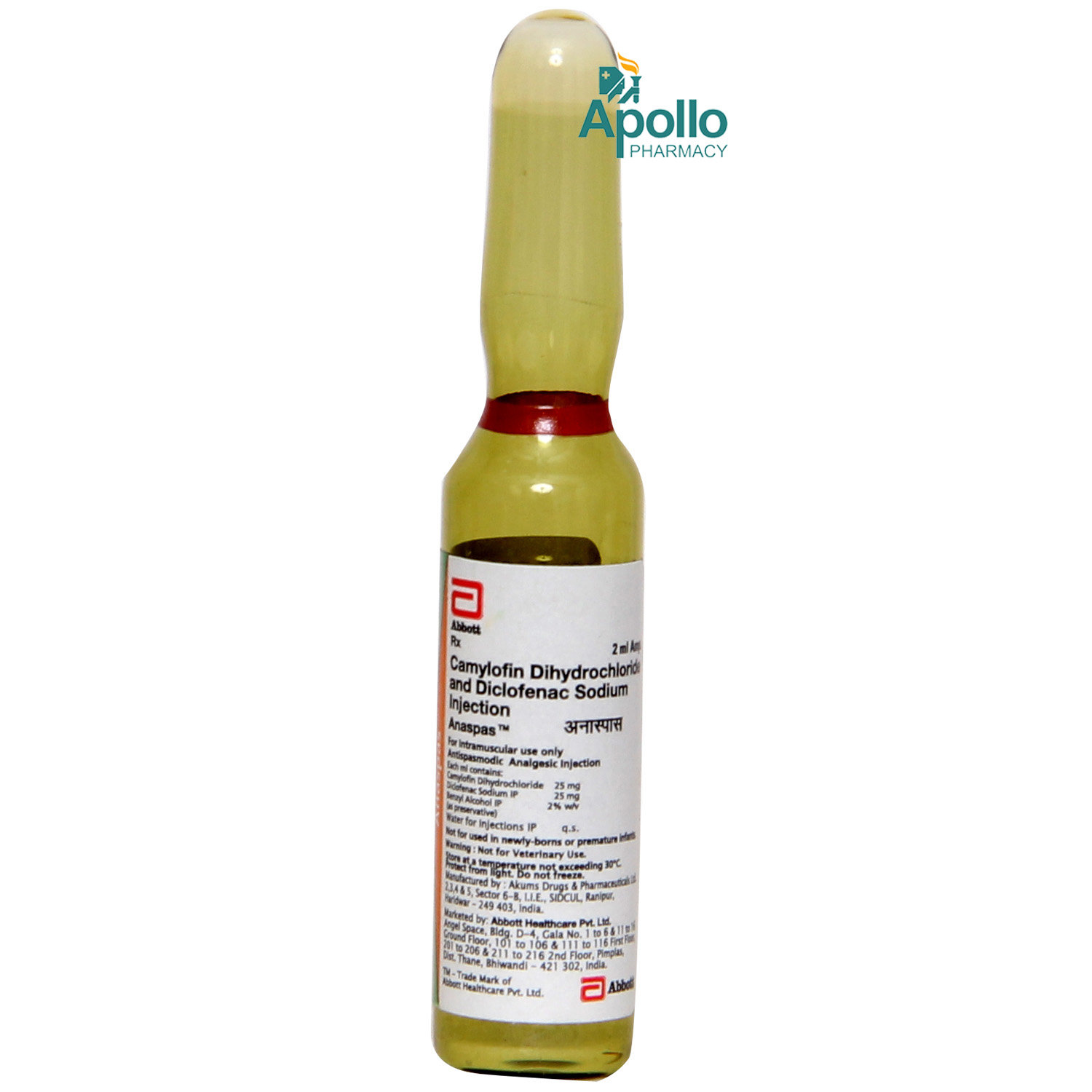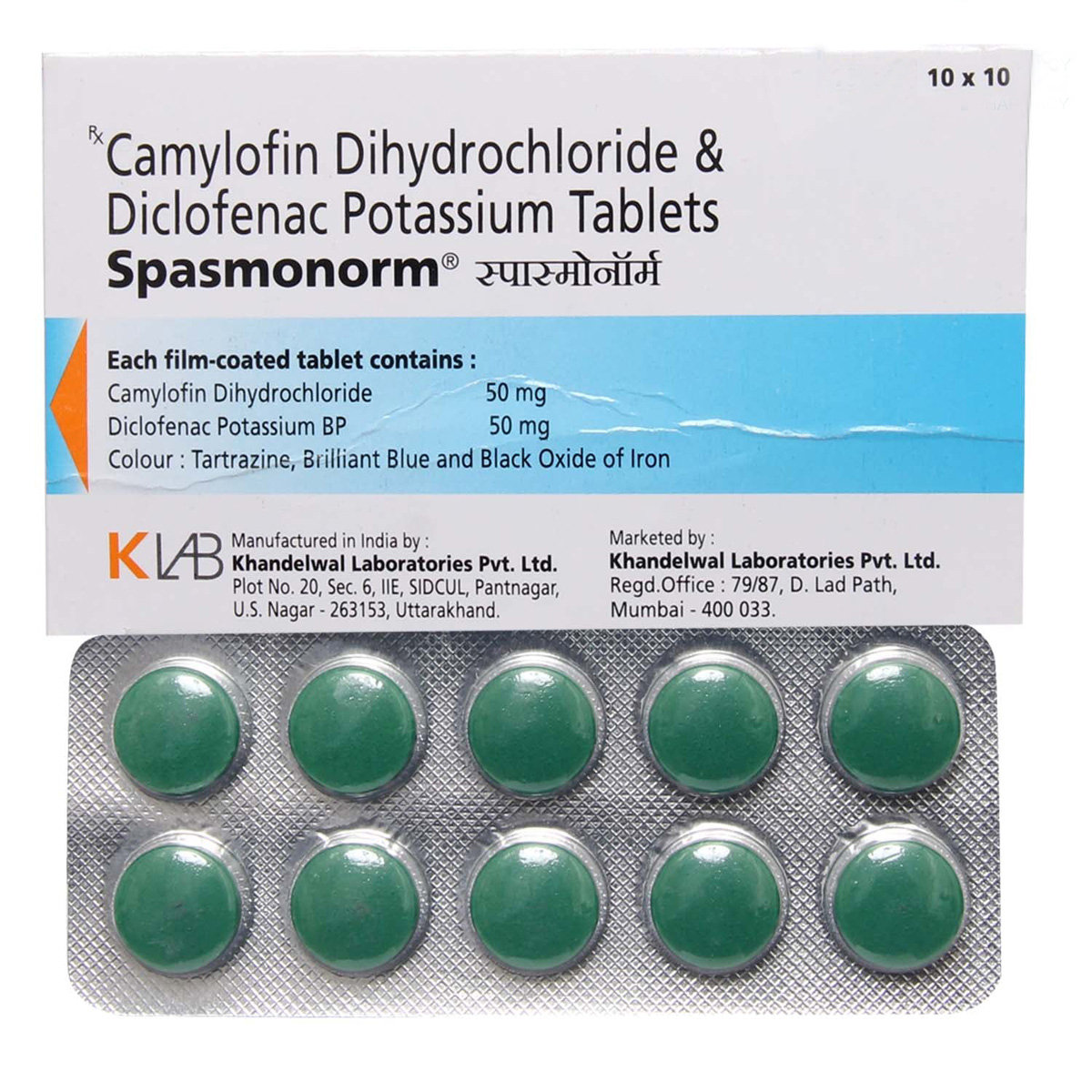Diclofenac+camylofin
About Diclofenac+camylofin
Camylofin+diclofenac belongs to the class of medications called ‘analgesics’. It is used to treat abdominal cramps or pain associated with various gastrointestinal conditions such as intestinal colic (blockage in the intestine), biliary colic (gallstones), renal colic (kidney stones), dysmenorrhea (menstrual cramps), and pancreatitis (inflammation of the pancreas), etc.
Camylofin+diclofenac contains Diclofenac and Camylofin. Diclofenac is a nonsteroidal anti-inflammatory drug (NSAID). It works by decreasing the production of prostaglandins (chemical substances that cause pain and inflammation) at the affected site (muscle) and reducing pain. Camylofin is an antispasmodic, which relaxes the stomach and gut (intestine) and stops sudden muscle contractions (spasms).
Camylofin+diclofenac should be used as prescribed by your doctor. Do not take more than the prescribed dose of medicine. Camylofin+diclofenac may cause side effects such as stomach pain, heartburn, diarrhea, nausea, vomiting, indigestion, loss of appetite, headache, and dizziness. These side effects are usually mild and temporary. However, if any of these side effects persist or get worse, inform your doctor immediately.
It is not recommended to take Camylofin+diclofenac if you are allergic to any contents of it. Before taking Camylofin+diclofenac, inform your doctor if you have bleeding or ulcer in the stomach, a history of stomach or bowel problems with NSAIDs, severe liver, kidney, or heart failure, history of heart attack or stroke, problems with blood circulation, glaucoma (increased pressure in the eye), mechanical bowel obstruction, and prostate gland enlargement. It is not recommended for children, pregnant women, and breastfeeding mothers. It should be used with caution in elderly patients. Avoid consumption of alcohol as it may increase the risk of side effects. Camylofin+diclofenac may occasionally cause dizziness or vision problems, so do not drive or operate heavy machinery if you are not fully alert or your vision is not clear.
Uses of Diclofenac+camylofin
Medicinal Benefits
Camylofin+diclofenac is used to provide symptomatic relief or treat abdominal cramps in various conditions such as intestinal colic (blockage in the intestine), biliary colic (gallstones), renal colic (kidney stones), dysmenorrhea (menstrual cramps), and pancreatitis (inflammation of the pancreas), etc. It contains diclofenac and camylofin. Diclofenac can reduce pain, swelling, and inflammation, whereas camylofin can reduce spasms or sudden contractions by relaxing the smooth muscles. It is usually well-tolerated when taken at recommended doses.
Directions for Use
Storage
Side Effects of Diclofenac+camylofin
- Stomach pain
- Heartburn
- Diarrhea
- Nausea
- Vomiting
- Indigestion
- Loss of appetite
- Headache
- Dizziness
Drug Warnings
Before taking Camylofin+diclofenac, inform your doctor if you have any bowel disorders such as colitis (inflammation of the intestine), kidney or liver problems, porphyria (inherited blood disorder), bleeding disorders, asthma, chronic obstructive pulmonary disease (obstruction in the airflow), seasonal allergies, long-term respiratory infections or illnesses, fever, angina (chest pain), blood clots, high blood pressure, high cholesterol, diabetes, systemic lupus erythematosus (a skin disorder), thyrotoxicosis (excess thyroid hormone secretions), smoking habit, and intolerance to some sugars. Camylofin+diclofenac increases the risk of heart attack or stroke if high doses are used for prolonged periods. So, use it in the dose and duration prescribed by the doctor. If you notice chest pain, breathing difficulties, weakness, or slurry speech, inform your doctor immediately, as it can be a sign of problems with the heart or blood vessels. Camylofin+diclofenac is an anti-inflammatory and can mask the symptoms of an infection, so consult your doctor if you feel unwell. Camylofin+diclofenac should be used with caution in patients undergoing heart surgery.
Drug Interactions
Drug-Drug Interactions: Camylofin+diclofenac may interact with anticoagulant (warfarin), medications used to treat diabetes, antidepressants (amitriptyline, imipramine), water pills, anticancer agents (methotrexate), medications that suppress the immune system (tacrolimus and ciclosporin), a medicine used to treat urinary tract infections (trimethoprim), quinolone antibiotics, other pain killers (aspirin and ibuprofen), a medication used to terminate the pregnancy (mifepristone), a medicine used to treat heart problems (digoxin), steroids, medications used to treat high blood pressure, a medication used to treat fits (phenytoin), medications used to lower cholesterol levels (colestipol and cholestyramine), and medicine used to treat heart rhythm problems (quinidine).
Drug-Food Interactions: No interactions found.
Drug-Disease Interactions: Camylofin+diclofenac should not be used in patients with bleeding or ulcer in the stomach, history of stomach or bowel problems with NSAIDs, severe liver, kidney, or heart failure, heart attack history or stroke, glaucoma (increased pressure inside the eye), enlarged prostate gland, and problems with blood circulation.
Drug-Drug Interactions Checker List:
Safety Advice

Alcohol
cautionConsumption of alcohol increases the risk of side effects, such as liver damage and bleeding in the stomach.

Pregnancy
unsafeCamylofin+diclofenac is not recommended during pregnancy, especially if you are more than six months pregnant, as it may cause harmful effects to the unborn baby. Please consult your doctor. Your doctor will prescribe only if the benefits outweigh the risks.

Breast Feeding
cautionCamylofin+diclofenac should be avoided in breastfeeding mothers as it may cause harmful effects on the nursing baby. However, if prescribed, the doctor may advise you to stop breastfeeding while receiving this medicine.

Driving
cautionCamylofin+diclofenac may cause dizziness or vision problems in some cases, so do not drive or operate heavy machinery if you are not fully alert or your vision is unclear.

Liver
cautionCamylofin+diclofenac should be used with caution in patients with liver diseases. The dose may have to be adjusted by your doctor if needed based on your medical condition.

Kidney
cautionCamylofin+diclofenac should be used with caution in patients with kidney diseases. The dose may have to be adjusted by your doctor if needed based on your medical condition.

Children
unsafeCamylofin+diclofenac is not recommended for children below 12 years of age as the safety and efficacy are not established.
Habit Forming
Diet & Lifestyle Advise
- Include more glucosamine, chondroitin sulfate, Vitamin D, and calcium-enriched supplements. Besides this, turmeric and fish oils can help in reducing pain and inflammation in the tissue.
- Please do not go for heavy exercise as it may increase abdominal pain. Instead, you can do stretching, low-impact aerobic exercise (like walking on the treadmill, bike riding, and swimming), and simple forms of yoga. You can also strengthen your muscle strength by lifting light weights and doing muscle stretching regularly.
- Your sitting posture is important, especially when you have pain and inflammation condition. Try to sit as little as possible and only for a short time (10-15 min). Use back support like a rolled-up towel to minimise pain at the back of your curve. Keep your knees and hips at a right angle.
Special Advise
Patients Concern
Disease/Condition Glossary
Intestinal colic: It is a cramp-like pain that originates in the small or large intestine. It's caused by a blockage that keeps food and liquid from passing through the body.
Biliary colic: It is a dull pain in the middle to the abdomen's upper right area. When a gallstone blocks the bile duct, the tube normally drains bile from the gallbladder to the small intestine.
Renal colic: It is a sharp, severe, or intense abdominal pain due to blockage of the urinary tract (kidneys, ureters, bladder, and urethra) by urinary stones.
Dysmenorrhea: It refers to abdominal cramps/pain associated with irregular periods. It occurs just before or during menses. Menstrual cramps that cause throbbing pain in the lower belly during periods may vary from mild to severe.
Pancreatitis: It is inflammation of the pancreas and causes abdominal tenderness and pain.
FAQs
Camylofin+diclofenac is used in the treatment of abdominal cramps or pain. It contains Diclofenac and Camylofin. Diclofenac works by reducing prostaglandins' production (chemical substances that cause pain and inflammation) at the affected site (muscle) and reducing pain. Camylofin relaxes the muscles in the stomach and gut (intestine) and stops sudden muscle contractions (spasms). Together, Camylofin+diclofenac can effectively reduce abdominal cramps associated with various conditions.
Camylofin+diclofenac is probably safe and well-tolerated in diabetic patients when taken at recommended doses. However, higher doses or prolonged use may affect sugar levels and cause unwanted effects. So, let your doctor know that you have diabetes before taking Camylofin+diclofenac.
It is not recommended to take antidepressants along with Camylofin+diclofenac. Camylofin+diclofenac may increase the risk of serious side effects or worsen the health condition when taken with antidepressants.






